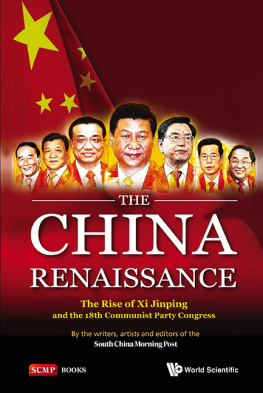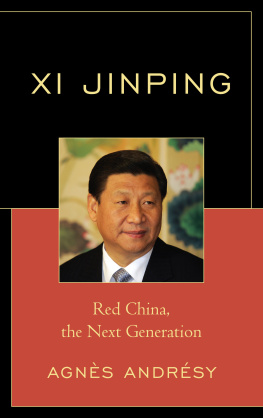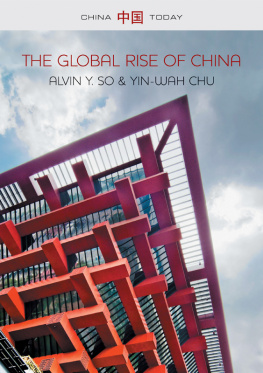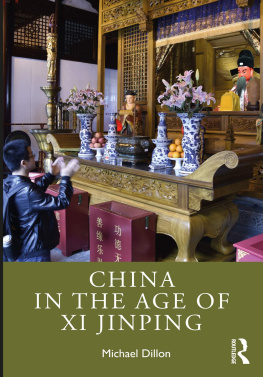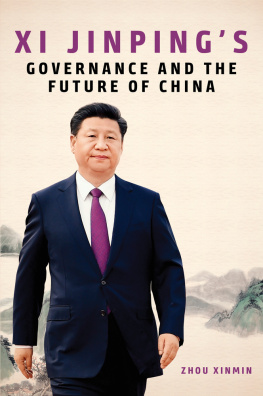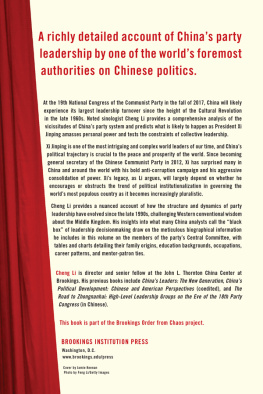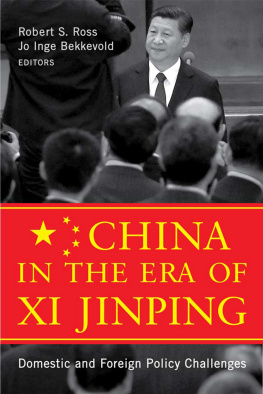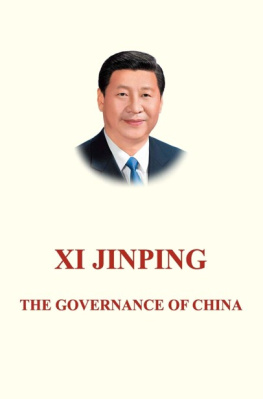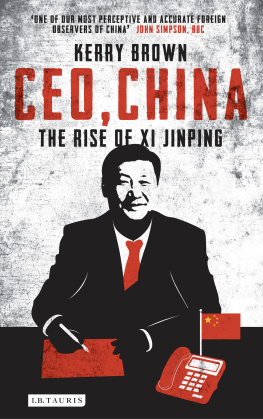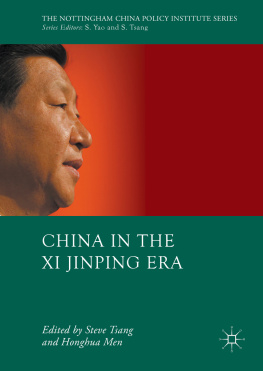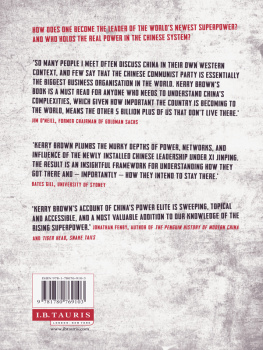The Rise of Xi Jinping
and the 18th Communist Party Congress
The Rise of Xi Jinping
and the 18th Communist Party Congress
By the writers, artists and editors of the
South China Morning Post
Edited by Jonathan Sharp
Published by
World Scientific Publishing Co. Pte. Ltd.
5 Toh Tuck Link, Singapore 596224
USA office: 27 Warren Street, Suite 401-402, Hackensack, NJ 07601
UK office: 57 Shelton Street, Covent Garden, London WC2H 9HE
British Library Cataloguing-in-Publication Data
A catalogue record for this book is available from the British Library.
THE CHINA RENAISSANCE
The Rise of Xi Jinping and the 18th Communist Party Congress
Copyright 2013 by South China Morning Post Publishers Limited
All rights reserved.
ISBN 978-981-4522-86-1 (pbk) Printed
Printed in Singapore by Mainland Press Pte Ltd.
Foreword
In November 2012, an ageing generation of Chinese leaders headed by Communist Party Chief Hu Jintao stepped aside and handed power to the fifth generation led by Xi Jinping. While the 18th Communist Party Congress and the transfer of state posts at the parliament meeting the following March went off smoothly, the year of transition was anything but orderly. Any Chinese transfer of power would be expected to yield its share of behind the scenes jockeying and intrigue the traditional secrecy of the partys political process virtually ensures it. But 2012 featured for the first time overt campaigning for high office more resembling American democracy than Chinese communism. It also saw the downfall of one of the countrys most popular leaders involved in that campaigning, Bo Xilai, undone by a web of corruption, betrayal and murder. A protg of Hu Jintao saw his political career self-destruct in another scandal.
From the start of 2012, the South China Morning Post embarked on an ambitious project to chart the transfer of power and pull the veil of secrecy from a new generation of Chinese leaders who will run the country for the next decade. The result was unparalleled coverage and a series of exclusives that kept the newspaper well ahead on the story. To list but a few: the Post was first among international media in reporting the line-up of the seven men who would form the elite Politburo Standing Committee that story was published before the secretive Congress even opened; the newspaper also was first with the news that Hu would retire from all of his posts, including the military commission chairmanship, despite speculation he might hang on as past leaders have done; the newspaper also led the way on the saga of one of Hus aides, Ling Jihua, whose career ambitions were clipped after the cover up of a Ferrari crash that killed his son. Along the way, we also profiled all of the other senior leaders who would rise in the new leadership.
Xi completed the transition in March by taking on the presidency, and the stakes could not be higher. If Hus decade saw China grow from an economy roughly the size of Italy to surpass Japan by the time he stepped down, then Xis decade is expected to see China grow to rival the United States as the top economic power in the world. Shanghai has grand ambitions of becoming a global financial centre, but critical reforms to the markets and the renminbi currency must take place for it to get there. China is modernising its military to ensure it can protect its security in Asia if not project its presence beyond the region. Yet at home it still grapples with the threat of unrest seeing thousands of mass protests each year and developing country problems related to its growth for growths sake strategy that has left its air, land and water-ways poisoned by pollution. Who are the people that will guide China through its challenges at home and on the global stage? Through our profiles of dozens of rising stars and movers and shakers over the past year, the South China Morning Post has provided the most complete portrait to date of the leaders who will control the halls of power of the worlds most populous country over the next decade.
The book profiles the 25 members of Chinas new Politburo, starting with Xi and six other standing committee members. We look at senior Cabinet of ficials and financial leaders who will be overseers of Chinas economy and architects of its regulatory transformation, as well as top leaders running the countrys domestic, military and foreign affairs. We also chart the most dramatic political episode of the transition, the collapse of Bo Xilai, and the challenge the sieve-like Weibo poses for a party accustomed to secrecy and control of information. Finally, we reveal the sixth generation of leaders those who are expected to assume power when Xis generation is ready to retire in 2022. There are many unknowns as the new leaders set out to chart the course of Chinese history over the next decade. This book, by the reporters and editors of the South China Morning Post, aims to provide the reader with a comprehensive primer on the men, and the handful of women, who are going to be charting that course.
Wang Xiangwei
Editor-in-Chief, the South China Morning Post
March 2013
Contents
The rise of Xi Jinping and the 18th Party Congress
From Strongman to
Consensus Rule
by Cary Huang
Chinas Communist Party may have long since moved on from its violent legacy of bloody purges and ruthless power grabs that punctuated the early decades of the Peoples Republic. But the level of intrigue and infighting that permeated the months leading up to and during the 18th Communist Party Congress in November 2012 showed that in China the transfer of power is just as contentious as ever. As a sign of the uncertainties bedevilling the handing over to the so-called fifth generation of Chinese leaders, not even the date of the congress of the worlds largest political party in charge of the globes most populous nation and its second largest economy was made public until a mere six weeks before the opening.
The era when China was effectively run according to dictates or whims of strongmen such as Mao Zedong and Deng Xiaoping has long since passed. Nowadays the Communist Party of China strives to project an image of consensus-building among a collective leadership.
However, whatever the effort to provide a smoothly scripted process, the bitter feuding that was clearly apparent in the run-up to the 18th party congress may well have been just as intense as any that occurred at previous such junctures, at least since the 196676 Cultural Revolution.
Tensions were bound to run high at the latest conclave, particularly as almost 60 percent of the 205 members of the Central Committee were being replaced, 14 of 25 members of the Politburo were relinquishing office and seven out of nine members of the inner sanctum of power, the Politburo Standing Committee, would retire. Only twice previously in the history of the Chinese Communist Party had so many leadership positions become available at the same time at a party congress.

